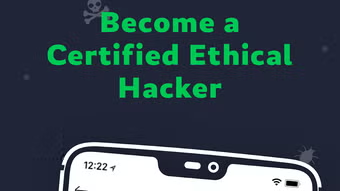In today’s digital world, cybersecurity is more important than ever. With increasing cyber threats, organizations need professionals who can secure systems by thinking like hackers. That’s where Ethical Hacking comes in.
In this blog post, we’ll explain everything you need to know about Ethical Hacking, including how it works, its legality, how to become an ethical hacker, and more. Whether you’re just curious or want to pursue a career in cybersecurity, this guide will help you understand the essential details.
📌 What Is Ethical Hacking?
Ethical hacking, also known as white-hat hacking, is the practice of legally breaking into computers and devices to test an organization’s defenses. Ethical hackers use the same methods as malicious hackers, but their intent is to find and fix security vulnerabilities—not to exploit them.
🔐 Why Is Ethical Hacking Important?
Cyberattacks can result in stolen data, damaged reputations, and huge financial losses. Ethical hackers help prevent this by:
-
Testing for weak points in software, networks, or hardware
-
Helping companies meet cybersecurity regulations
-
Preventing data breaches and protecting customer privacy
-
Training staff on security best practices
⚖️ Is Ethical Hacking Legal?
Yes, ethical hacking is legal—as long as it is done with proper authorization.
✅ An ethical hacker must have written permission from the system owner before testing.
Unauthorized hacking—even if you don’t cause harm—is illegal and can lead to criminal charges. Always follow legal procedures and respect data privacy.
🧠 Skills Required for Ethical Hacking
Becoming an ethical hacker requires a strong understanding of computers, networks, and security systems. Key skills include:
-
✅ Knowledge of operating systems (Windows, Linux, macOS)
-
✅ Networking fundamentals (TCP/IP, DNS, VPNs)
-
✅ Programming skills (Python, JavaScript, Bash)
-
✅ Familiarity with security tools (Wireshark, Metasploit, Burp Suite)
-
✅ Understanding of encryption, firewalls, and antivirus systems
🧪 Types of Ethical Hacking
There are several areas where ethical hackers operate:
| Type of Ethical Hacking | Description |
|---|---|
| Network Hacking | Finding vulnerabilities in wired or wireless networks |
| Web Application Hacking | Testing websites for security flaws like XSS and SQL injection |
| System Hacking | Identifying weaknesses in computer systems |
| Social Engineering | Testing employees’ awareness (e.g., phishing attacks) |
| Wireless Hacking | Attacking Wi-Fi networks to find misconfigurations |
🛠️ Ethical Hacking Tools (2025)
Ethical hackers use various tools to simulate cyberattacks. Some popular tools in 2025 include:
-
Nmap – Network mapper and scanner
-
Kali Linux – A Linux distribution loaded with hacking tools
-
Burp Suite – Web vulnerability scanner
-
Metasploit Framework – Exploitation toolkit
-
Wireshark – Network protocol analyzer
-
John the Ripper – Password cracking tool
🔎 Important: Always use these tools in a legal and authorized environment.
🎓 How to Become a Certified Ethical Hacker
If you want to pursue a career in ethical hacking, start with the right education and certifications.
📚 Recommended Steps:
-
Learn Networking & Security Fundamentals
-
Practice on Legal Platforms like Hack The Box or TryHackMe
-
Take Certification Courses such as:
-
CEH (Certified Ethical Hacker)
-
CompTIA Security+
-
OSCP (Offensive Security Certified Professional)
-
CISSP (Certified Information Systems Security Professional)
-
-
Stay Updated with the latest hacking trends and technologies
💼 Career Opportunities in Ethical Hacking
Ethical hackers are in high demand across industries like finance, healthcare, e-commerce, and government. Here are some common job roles:
-
Penetration Tester (Pentester)
-
Security Analyst
-
Vulnerability Assessor
-
Information Security Consultant
-
Cybersecurity Engineer
💰 Average Salary (2025): $80,000 to $150,000 per year depending on experience and location.
🔒 Difference Between Ethical Hacking and Malicious Hacking
| Ethical Hacking (White Hat) | Malicious Hacking (Black Hat) |
|---|---|
| Legal & authorized | Illegal & unauthorized |
| Protects systems | Attacks systems |
| Gets paid by companies | May steal data or money |
| Follows ethical codes | Violates laws and privacy |
🧑⚖️ Legal Considerations & Ethics
As an ethical hacker, you must:
-
Never test systems without written consent
-
Protect sensitive data you come across
-
Report vulnerabilities to the correct authority
-
Follow local and international cyber laws (like GDPR, HIPAA, etc.)
🚫 Never use your skills for personal gain or harm—this is a clear violation of ethics.
🌐 Ethical Hacking FAQs
❓ Can I learn ethical hacking for free?
Yes. There are many free resources online like YouTube tutorials, blogs, and open-source platforms.
❓ Do I need a degree to become an ethical hacker?
Not always, but a degree in cybersecurity or computer science can help. Skills and certifications matter more.
❓ Is ethical hacking safe?
Yes, when done legally. Always make sure you’re working in a secure and authorized environment.
🔍 SEO Keywords You Can Target
-
What is ethical hacking?
-
Ethical hacking guide 2025
-
How to become an ethical hacker
-
Certified ethical hacker course
-
Legal hacking techniques
-
Cybersecurity tips 2025
✅ Conclusion
Ethical hacking is a powerful and legal way to secure digital systems in today’s connected world. By learning ethical hacking, you can help companies prevent cyberattacks, protect data, and build a strong career in cybersecurity.



